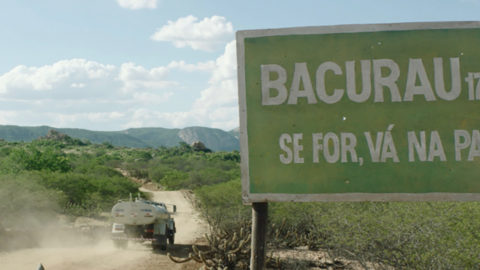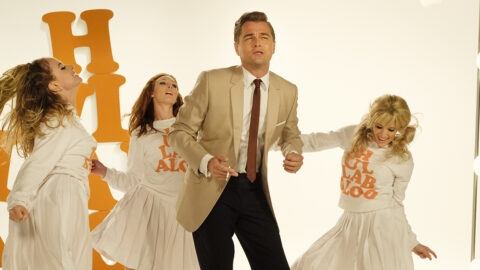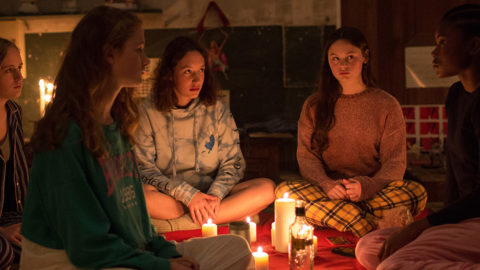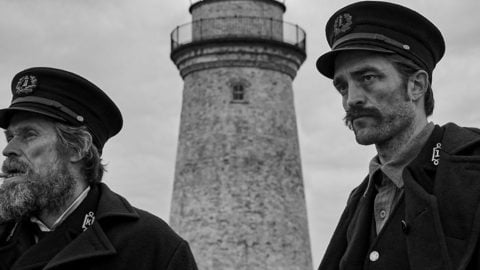Interview: Mati Diop
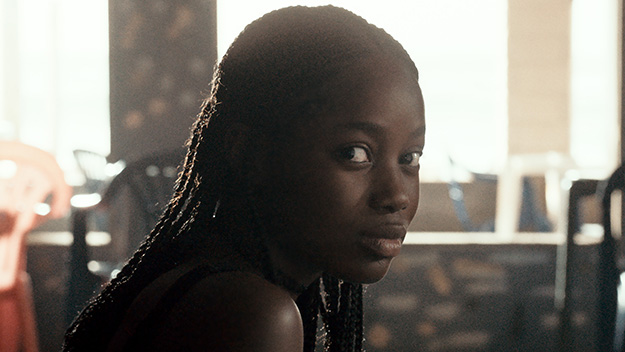
Atlantics (Mati Diop, 2019)
Though she’s considered a first-time filmmaker by Cannes standards, Mati Diop is hardly a newcomer, having spent more than a decade working as an actress in films by Claire Denis (35 Shots of Rum), Antonio Campos (Simon Killer), and Matías Piñeiro (Hermia and Helena), and directing a small but vital collection of shorts. Her mid-length Mille soleils (2013) played throughout the world, mostly in documentary festivals, as did the haunting short Atlantiques (2009); that film shares a title with her first feature, which appeared in the Main Competition this year at Cannes. Mille soleils addressed Diop’s artistic pedigree, revisiting and recasting the lead actor from her Senegalese uncle Djibril Diop Mambéty’s Touki Bouki (1972) in a dramatization of his current life; Atlantiques took a poetic and elliptical approach to honoring the experiences of economic refugees who have sailed in dangerous seas from Senegal to Spain in search of better work. That search animates the opening sequence of the her new feature Atlantics, in which laborers at a looming, half-built skyscraper agitate for unpaid wages, which in turn animates a group to board a rickety ship to Europe. Yet what follows is less of a docu-fiction hybrid than her previous work suggested; instead it’s a mix of classical storytelling and genre gambits—a practical love contrasted with one of passion, a detective story, a haunting—with unique stylizations, from subjective music cues to provocative reverses and long takes.
Commensurate with her track record, expectations were high for this new film, which is the first work ever in competition directed by a woman of color. Diop occupies such rare air seemingly effortlessly, or perhaps just sincerely. Her work, and her way of discussing it, comes from the inside out, and feels motivated by that which can’t be easily expressed and understood, rather than by any notions of what shapes the work ought to take. The following interview took place at the 2019 Cannes Film Festival.
Atlantics is not quite what your shorts led me to believe you would be making with your first feature. There isn’t really the documentary hybrid aspect, and there are strong genre elements I hadn’t discerned in that previous work. I’d love to know how you got here.
In the short film [Atlantiques], the fantasy dimension was already there, but in a very minimal way. It was already a ghost story, the short. But then I was very influenced by the Senegalese Spring, which arrived six months after the Arabic Spring. I knew I wanted to make a ghost film on the situation of the immigration, but the events of the Dakarian Spring gave me the vital aspect of Atlantics the feature. I needed to talk about this lost generation through this new chapter. I felt in my imagination that the youth I could see in the streets [involved in] fires and protests were inhabited by the loss of all the boys that disappeared. I felt there was an invisible link between these two periods, that the boys who left Dakar for Spain, those who didn’t make it and who die in the sea, took something of the living with them. And that the ones in 2012 who were in the streets shouting and asking for change were also fed by their loss. Trying to make these two chapters, these two precise moments of Dakar, of Senegal, coexist was something I was interested in.
I like to set my films in the hyper-present, in order to make the past and the future circular. I could have written a film that takes place in 2006, a ghost film with young men suddenly disappearing, where nobody knows what happened, then they come back as ghosts. But I’m more interested in the traces of that period on the present, and, voilà, very interested in the traces of these laws on the intimacy of this young woman. There is this tradition that when you make your first feature you tell your own story a little bit, talk about your teenage moments. I found out later that writing this character of Ada was a way to live the African adolescence I didn’t have a chance to live. I lived my adolescence in Paris, in a very white environment—which was fine, but I think that all the episodes, all the periods I didn’t spend in Senegal as a mixed girl, I needed to find it back. I have a very strong link with the character. I invent and create, and it’s really a way for me to live a parallel life.
That makes me want to revisit the term you just introduced, the hyper-present. This seems relevant to your creating a character who has a parallel life to yours, allowing you to be, in a sense, hyper-alive through her. And by setting the film in the present, instead of 2006 as you said you might have, you’ve got actors playing people their own age living during the same time that they’re actually living. And to continue with your notion of a ghost story, they’re haunted by their own experiences, their own lives, their own understanding of this environment, which helps to create this hyper-present.
Oui. For example, you know, with Atlantiques [the short], it’s more a documentary approach—this young man called Serigne told me about his journey from Dakar to Spain with his two friends, and the idea was really to give back [their story to them]. It was a time when mass media was transforming the reality of a lot of people. But the characters in the feature don’t have a direct relationship to those boys [lost at sea]. I needed them to be very aware of the economic and social background of the character. I found Dior, the barmaid, in a discotheque, working as barmaid. I found Souleiman, the lover of Ada, on a construction site. I need the actors to know the characters better than I do. It took me seven months to find [the actress who plays] Ada, and she was not doing anything when I met her. She’s 18, she didn’t go to school, she’s the one who cooks and does the dishes at home. But she managed to become Ada, and I think it’s really impacting her life. She might go back to school, or she might get a job—she’s living kind of the same metamorphosis [as Ada]. When I met her she was supposed to marry somebody.
An arranged situation?
No, but still the idea of marriage as a plan. Which I’m not supposed to have a judgment on, but I mean…
It’s interesting because on one hand, having worked as an actress, I know they have less experience than you, yet they’re more familiar with their milieu than you are. I would imagine there’s this dance of how to guide them toward effectively being themselves rather than toward whatever you’d imagined for the characters before you’d met the actors to play them.
This is something I experienced with Claire [Denis]. The magic aspect is finding the right person. I understood that most of the work didn’t really come from her direction on set, but from the fact that she chose the right person for the role. It’s not really about what she’s going to say on set to make me understand. There’s a dimension that goes beyond. It’s very mysterious, I think, the art of casting, finding an actor. It’s like finding the person who is actually the character that you invented. It came out of your imagination, but then suddenly you have to make it exist, and it’s somewhere in the city, and you just don’t know where it’s going. I don’t know if it happens to you in life: when you’ve met somebody, and you have this really strange feeling that it cannot be just a random encounter? I think casting is very mysterious.
Also mysterious is what you do about an hour into the film, introducing a new set of characters as well as a supernatural element. Yet it doesn’t play as a dramatic narrative turn—it seems to emerge from the texture of the film. On paper, it’s a major turn, but you handle it so surely and subtly.
It’s one of the moments in the film that I’m really excited about. I guess I really love switches. It’s something I’m really excited to film, to see the reality shifting under my eyes. I’ve always been very seduced by the aesthetic of djinns in Islamic culture, the fact that in the legend they come out at the ascended hour. I like to show the dynamic between nature, to feel the magnetism of nature on the body, on the people. I’m going to give a very strange reference, but I love Picnic at Hanging Rock. I love the scenes when the girls climb around the rocks, and you can feel the magnetism of the rock. One other thing I like to film is physical reaction to invisible things, like a trance. I love the sensuality of it, the body language. That’s also why I’m really sensitive to Claire Denis’s work. As a spectator, I really love to be magnetized. It probably has a lot to do with my relationship with music. The first thing I wanted to become was a musician; I played music as a teenager and was going to become a bassist. But it was too abstract for me, I needed to say much more. I listen to more music than I watch films. So the symbol of this force having power over you is a metaphor for so many things. When I was writing I was thinking the invisible force that was taking possession [over people] as a way to talk about very different, very strong influences. Africa was crossed at first by the Arabic and Muslim culture, who colonized black Africa, then France, then of course American culture, and now it’s China and Dubai. It was also a way to try to figure out how today looks, what the imagination and the landscape, the interior landscape, of a young girl of Senegal today looks like in terms of influences.
One possesses the other by overtaking the other, which then transforms the host into something else. This happens to your characters, and it also happens to your film.
And the first possession, as I mentioned, is these boys who are already gone. They took the boat, and in their spirit they are already over there.
Eric Hynes is a journalist and critic, and curator of film at Museum of the Moving Image in New York.



